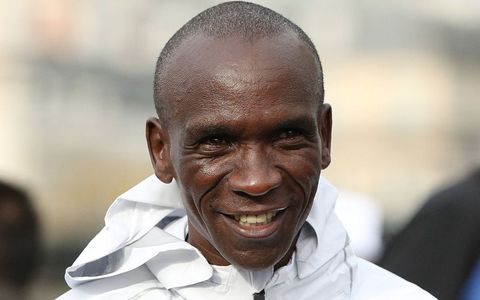7 critical things two time Olympic marathon champion Eliud Kipchoge has adhered to in training that have made him the GOAT.
Eliud Kipchoge is widely regarded as the greatest marathoner of all time, and his meticulous training routine plays a crucial role in his dominance.
In October 2019, Kipchoge achieved an extraordinary milestone by becoming the first man to complete the marathon distance in under two hours, an awe-inspiring feat that defied conventional expectations.
Clocking an incredible time of 1:59:40 in Vienna, the Kenyan cemented his name in the history books and solidified his status as a legend of distance running.
Eliud Kipchoge is looking to put turbulent 2024 season behind at London Marathon.
Although this monumental achievement wasn’t officially recognized as a world record due to the controlled conditions of the event, it showcased his unparalleled endurance and mental fortitude.
Kipchoge has also officially held the marathon world record twice in competitive events. His 2:01:09 mark, set in Berlin in 2022, stood until fellow Kenyan Kelvin Kiptum shattered it with a time of 2:00:35 in Chicago the following year.
But beyond the records and accolades, Kipchoge’s success is built on an unyielding work ethic and a carefully crafted training regimen. Here are some key aspects of his training that set him apart:
PAY ATTENTION: Stay updated with the Latest Athletics News in Kenya from Pulse Sports.
1. Mastering the art of recovery runs
)
Eliud Kipchoge is keen on recovery runs. Photo || Courtesy
Kipchoge’s recovery runs begin at a shuffle—around an 8:30 to 8:45-minute-mile pace—and gradually build up to finish at around 6:30 to 7 minutes per mile.
This means he starts at four minutes per mile slower than his marathon pace and still remains two minutes per mile off at the end.
The purpose of these runs is to build endurance while allowing his body to recover from intense workouts. His weekly mileage totals an astonishing 124 to 136 miles, ensuring he is always primed for high-performance sessions.
2. Strength and mobility training
Twice a week, Kipchoge dedicates an hour to strength and mobility exercises, using yoga mats and resistance bands. The focus is on the posterior chain—particularly the glutes, hamstrings, and core. His routine includes:
Glute abduction moves with resistance bands, bridges, planks, single-leg deadlifts, proprioception and balance exercises and gentle stretching to finish
Unlike many elite athletes, Kipchoge does not lift weights. His goal with strength training is primarily injury prevention rather than muscle building.
3. A simple but disciplined lifestyle
Kipchoge follows a strict daily schedule:
-
Wakes up at 5:45 A.M.
-
Trains in the morning 6-8 AM
-
Naps for an hour during the day.2-3 PM
-
Reads or chats with teammates during his spare time
-
Sleeps by 9 P.M.
Despite his global fame, Kipchoge is remarkably disciplined and focused, excelling at the art of doing nothing when needed.
4. Optimal hydration and nutrition
Kipchoge drinks three liters of water daily and has fine-tuned his diet with the help of a nutritionist. His meals consist of: Homemade bread
-
Local fruits and vegetables
-
Kenyan tea
-
Meat
-
Ugali, a dense maize-flour porridge
)
Photo || Eliud Kipchoge
Surprisingly, Kipchoge does not take any supplements, relying solely on natural foods to fuel his training.
5. Regular physiotherapy for recovery
Kipchoge gets a massage twice a week from his long-time physiotherapist, Peter Nduhiu, who has worked with him since 2003. These sessions help him recover and stay injury-free despite his heavy training load.
6. Old-school training logs
)
Kipchoge keeps detailed training logs that track everything from the time, pace, and location of each run to which shoes he wore. (Photo: NN Running Team)
While most modern runners rely on GPS watches and apps, Kipchoge meticulously records every detail of his training in a notebook. He has maintained this habit since 2003, now possessing 18 seasons’ worth of training logs to reflect on and analyze.
7. Balancing training intensities
Kipchoge’s training program is carefully structured to avoid burnout. Out of his weekly 220 km (137 miles), only 15-20% is spent on high-intensity efforts. The breakdown is as follows:
-
82-84% at an easy or light intensity
-
9-10% at moderate intensity
-
7-8% at hard or high intensity
This strategic approach allows him to sustain peak performance while minimizing injury risks.
Eliud Kipchoge’s legendary status is no accident. His training philosophy revolves around consistency, discipline, and strategic workload management.
From slow recovery runs to mindful race pacing and a holistic lifestyle, every aspect of his routine is fine-tuned for greatness. By embracing simplicity and trusting his process, Kipchoge continues to push the limits of human endurance.
Eliud Kipchoge’s Weekly Training Schedule
Monday
Tuesday
-
Morning (9 A.M.): Track workout covering 9 to 10 miles, focusing on speed at marathon pace or slightly faster, on a rough dirt track
-
Example sessions:
-
8 x 1,600m in 4:40 with 2-minute recovery
-
8 x 400m in 63-64 seconds with 30-50 seconds of recovery
-
-
-
Afternoon (4 P.M.): 6-mile easy run
Wednesday
-
Early Morning (6 A.M.): 12-mile easy run
-
Mid-Morning (10 A.M.): 60-minute strength and mobility session
-
Afternoon (4 P.M.): 6-mile recovery run
Thursday
Friday
-
Early Morning (6 A.M.): 12-mile easy run
-
Mid-Morning (10 A.M.): 60-minute strength and mobility workout
-
Afternoon (4 P.M.): 6-mile easy run
Saturday
-
Morning (6 A.M.): Fartlek session (13 sets of 3 minutes fast running, followed by 1-minute jogging)
-
Afternoon (4 P.M.): 6-mile easy run










